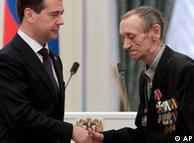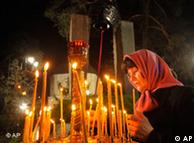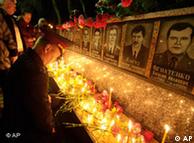DISASTERS | 26.04.2011
25 years on: Ukraine remembers Chernobyl
Ceremonies are taking place Tuesday to mark the 25th anniversary of the Chernobyl nuclear disaster in Ukraine, amid heightened fears over nuclear safety in the wake of the recent Fukushima accident in Japan.
Russian President Dmitry Medvedev is visiting the site of the Chernobyl accident on Tuesday to take part in a memorial service, joined by his Ukrainian counterpart, Viktor Yanukovych. President Alexander Lukashenko of Belarus, is however not joining the ceremony.
The memorial kicked off with a service led by Russian Orthodox Patriarch Kirill in the early hours of Tuesday. He struck a bell at 1.23 a.m. local time - the exact moment when the explosion happened. Several hundred Ukrainians, mostly widows of men who worked at the plant, attended the service.
Kirill told the relatives at the site that "the world had not known a catastrophe in peaceful times that could be compared to what happened in Chernobyl."
In the Ukrainian capital, Kiev, a bell tolled 25 times to mark the number of years that have passed since the accident.
Devastating effects
In the early hours of April 26, 1986, workers at the Chernobyl atomic power station in the then Soviet Union were carrying out a test on reactor four when operating errors and design flaws sparked successive explosions.
Radioactive debris landed around the reactor, creating an apocalyptic scene in the surrounding area, while material also blew into the neighboring Soviet republics of Belarus and Russia and further into western Europe.
At the time, Moscow said nothing about the disaster for three days, with the official news agency TASS only reporting an accident on April 28, after the Forsmark nuclear plant in Sweden recorded unusually high levels of radiation.
Two workers were killed in the explosion and 28 other people died of radiation exposure in the next months. Tens of thousands were forced from their homes and many suffered long-term health effects. The exact death toll is disputed; some estimates suggest it runs into the thousands.
 Russian President Medvedev honored rescue workers who were exposed to high levels of radiation
Russian President Medvedev honored rescue workers who were exposed to high levels of radiationMedvedev honors rescuers
In 1986 and 1987, the Soviet government sent more than half a million rescue workers, known as liquidators, to clear up the power station and decontaminate the surrounding area, many not fully aware of the scale of the calamity.
"I think that our modern states must see the main lesson of what happened at Chernobyl and the most recent Japanese tragedy as the necessity to tell people the truth," Medvedev told a meeting of liquidators in the Kremlin on Monday.
"The world is so fragile and we are so connected that any attempts to hide the truth, to gloss over a situation, to make it more optimistic, will end with tragedy and cost the lives of people."
The anniversary has gained contemporary resonance after the March 11 earthquake and tsunami in Japan which damaged reactors at the Fukushima nuclear power plant and prompted leaks of radiation. Along with Chernobyl, it's the only other disaster to be classed as level seven on the International Nuclear Event Scale.
Author: Joanna Impey (AFP, AP, dpa)
Editor: Rob Turner
Editor: Rob Turner
dw



No comments:
Post a Comment